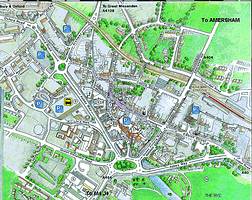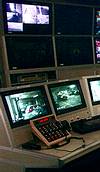

The use of CCTV can be greatly enhanced though coordinating its use with other technology and policing or security methods. This can occur prior to the CCTV identification of a developing or actual incident or once it has occurred.
On one hand, early warning of potential problems of issues can lead to proactive CCTV use, anticipation of incidents, improved gathering of evidence and deployment. On the other, communication with the response team can greatly help the effectiveness of apprehension of offenders and incident management.
Below, Mike Batchelor highlights a case study in the UK of the development of a radio network, which not only forms a type of business watch, but provides an early warning system for CCTV operators. Batchelor is Control Room Manager for the Wycombe District CCTV control room, one of the high profile centres in the UK. He is also on the CCTV User Group standards committee and provides specialist training for Tavcom.

"An initiative was introduce by Wycombe District Council some four years ago to provide a cooperative security radio network around the town. The system was implemented as a direct result of high levels of terrorist threat and was controlled from the town's new CCTV control room. Over the years, coinciding with the reduction in active terrorism on mainland Britain, the network has moved more towards a retail security tool. The system was given the name 'ShopWatch' and was immediately successful. Retail crime plummeted following several high-profile successes where gangs of thieves were arrested and successfully prosecuted through the use of the new radio scheme in cooperation with CCTV operations.
"Following the success of ShopWatch, attention turned to the licensed trade in the town. An existing, ring-a-round system had fallen out of favour and it was proposed to expand the ShopWatch initiative to include licensed premises. This decision did not meet with universal favour amongst retailers, some of whom expressed a security concern, and the decision was made to implement a second radio channel.
"In early 2000, the formation of Wycombe Watch was agreed, the title being chosen for the merged ShopWatch and PubWatch systems in High Wycombe. The organisation has employed a (part-time) coordinator with the aid of funding from Wycombe District Council and Thames Valley Police. The coordinator's responsibilities include expanding the user base, ensuring conformity with Codes of Practice, user training, radio provision and general duties! Wycombe Watch has been formed as a limited company to safeguard the interests of the members.
"ShopWatch uses a UHF local area channel, whilst PubWatch uses a local area VHF channel. It is intended to migrate the PubWatch users from VHF to share the ShopWatch UHF channel as soon as economically feasible. The costs of doing so at present are, however, prohibitive due to the residual value of legacy equipment. As an interim measure, permission has been received from the UK's radio spectrum regulatory body, the Radio-communications Agency, which allows cross-patching of the VHF channel to the UHF channel legally. This will allow all users to communicate freely with each other without requiring additional equipment until such time as we can migrate the existing PubWatch users to the UHF channel. The cross-patching will be enabled utilising the existing Zetron 4000 communications control system located in Wycombe District Council's CCTV control room.

"Control room operations staff will continue to monitor and control the use of the channels and will maintain operating standards and practices. This latter point is ongoing, given the relatively high security staff turnover in retail outlets. The radio communications system is seeing continued success. We hope to grow the user base from our 35 current users to 100 within 12 months. The approach adopted has been very much one of partnership - mutual benefit from joint effort - to improve the quality of life within the area of coverage for users, visitors and the business community alike. While it has taken a lot of effort to get to this stage it has been well worth while", concludes Batchelor.
At this stage, the focus on South African town centres has typically been on communication with police and at times municipal security. The High Wycombe situation described by Batchelor raises some interesting potential options for community involvement in South African centres.

Dr Craig Donald is an industrial psychologist and specialist in human factors in security and CCTV. He is the co-developer of the Surveillance and Monitoring Assessment Exercise (SAMAE) for the selection and placement of CCTV operators and presenter of the CCTV Surveillance Skills training course. He can be contacted on telephone: (011) 787 7811, fax: (011) 886 6815, or e-mail: [email protected]
© Technews Publishing (Pty) Ltd. | All Rights Reserved.